|
|
|
Sort Order |
|
|
|
Items / Page
|
|
|
|
|
|
|
| Srl | Item |
| 1 |
ID:
114156
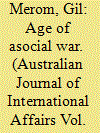

|
|
|
|
|
| Publication |
2012.
|
| Summary/Abstract |
Why, in spite of past failures, do liberal democracies continue to intervene militarily and fight counterinsurgency wars? The answer is grounded in learning. Liberal democracies acknowledge past failures, tracing them to the interaction between the events on the battlefield and society at home. Specifically, they identify the educated middle class and its mix of expedient and altruistic motivations as preventing effective military campaigns and victory. Hence, the main effort of liberal democracies is that they aim to fight wars that are divorced from society. At their disposal are advanced military technology, the professional all-volunteer force, proxies and alliance partners, and private military companies. The desocialising effects of these are complemented by control of the media and thereby the flow of information from the battlefield to society. Liberal democracies have found a way to continue to play the violent game of world politics, but they do so less democratically as they fight asocial wars.
|
|
|
|
|
|
|
|
|
|
|
|
|
|
|
|
| 2 |
ID:
114151
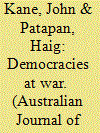

|
|
|
| 3 |
ID:
114152
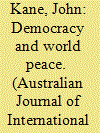

|
|
|
|
|
| Publication |
2012.
|
| Summary/Abstract |
When liberal democracies pursue idealistic goals they invite accusations of naivety and impracticality; if they act on strictly realistic premises they are accused of hypocrisy or betrayal of ideals. The author explores the consequences of this idealism-realism dilemma using the example of United States foreign policy and the particular case of Woodrow Wilson and the Covenant of the League of Nations. The author examines its theoretical roots by analysing the work of Immanuel Kant, who laid down the influential moral-political ideal of a democratic peace but posited so stark a theoretical gulf between morality and politics as to make the ideal seem unreachable. Kant tried to show how a world resistant to morality might nevertheless evolve towards one in which moral action had real political effect-a necessary condition, he believed, for an international federation of republics committed to peaceful coexistence. The implausibility of his account reveals the problematic nature of the idealism-realism divide, but also, in its attempt to bridge that divide, points the way towards a genuinely ethical-practical foreign policy founded in political prudence.
|
|
|
|
|
|
|
|
|
|
|
|
|
|
|
|
| 4 |
ID:
114153
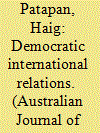

|
|
|
|
|
| Publication |
2012.
|
| Summary/Abstract |
The article examines the extent to which Montesquieu's doux commerce thesis, which claims that commerce leads to softening of manners and therefore favours international peace, presents a challenge to democratic peace theory. It argues that Montesquieu's claim that peace may be due to commerce, and not democracy, provides a theoretical challenge to those scholars who argue that there is a Kantian virtuous triangle of democracy. The practical implication of this theoretical challenge concerns the way democratic peace theory has influenced the practice of international politics, especially American foreign policy. The article argues that Montesquieu's doux commerce thesis mediates between the contending claims of realism and liberal internationalism over the merits of democratisation as an essential means for securing peace.
|
|
|
|
|
|
|
|
|
|
|
|
|
|
|
|
| 5 |
ID:
114155
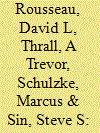

|
|
|
|
|
| Publication |
2012.
|
| Summary/Abstract |
Despite strong empirical evidence for democratic peace theory, the historical record indicates that democracies have been involved in many wars. This article conducts a critical examination of how democratic polities become entangled in international conflict. The examination focuses on how democratic leaders manage domestic politics and public opinion at each stage of the conflict (i.e. disputes, crises, wars and settlement). The study explores how democracies are drawn into conflict; when democracies provoke conflict; what claims democratic leaders make to justify conflict; when domestic audiences support or oppose conflict; and the implications for democratic leaders after conflicts. It argues that democratic leaders pursue various strategies that are shaped by the stage of the conflict, the domestic institutional structure and the level of mobilised domestic opposition.
|
|
|
|
|
|
|
|
|
|
|
|
|
|
|
|
| 6 |
ID:
114157


|
|
|
|
|
| Publication |
2012.
|
| Summary/Abstract |
This article argues that opposition political parties can play an important role in determining when and how a democracy exits a small war. Recent theoretical and empirical research on small wars has further uncovered the restrictions and constraints that democratic societies place on their government's war strategies. However, the mechanisms through which public opinion constrains and pressures government strategies have received relatively less academic attention. This article examines the role that opposition political parties play in providing an avenue through which society can shape foreign policy-namely, the exiting from small wars. It argues that opposition political parties can be instrumental in determining democracies' war termination in three ways: through 'elite cuing', applying electoral pressure, or winning an election and assuming government.
|
|
|
|
|
|
|
|
|
|
|
|
|
|
|
|
| 7 |
ID:
114154
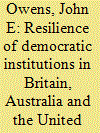

|
|
|
|
|
| Publication |
2012.
|
| Summary/Abstract |
To what extent are democratic institutions resilient when nation states mobilise for war? Normative and empirical political theorists have long argued that wars strengthen the executive and threaten constitutional politics. In modern democracies, national assemblies are supposed to hold the executive to account by demanding explanations for events and policies; and by scrutinising, reviewing and, if necessary, revising legislative proposals intended to be binding on the host society or policies that have been implemented already. This article examines the extent to which the British and Australian parliaments and the United States Congress held their wartime executives to account during World War II. The research finds that under conditions approaching those of total war, these democratic institutions not only continued to exist, but also proved to be resilient in representing public concerns and holding their executives to account, however imperfectly and notwithstanding delegating huge powers. In consequence, executives-more so British and Australian ministers than President Roosevelt-were required to be placatory as institutional and political tensions within national assemblies and between assemblies and executives continued, and assemblies often asserted themselves. In short, even under the most onerous wartime conditions, democratic politics mattered and democratic institutions were resilient.
|
|
|
|
|
|
|
|
|
|
|
|
|
|
|
|
|
|
|
|
|